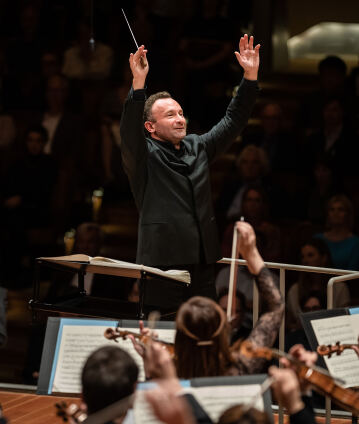Kirill Petrenko conducts Tchaikovsky and two world premieres

Kirill Petrenko continues his acclaimed Tchaikovsky interpretations with the symphonic poem Francesca da Rimini. He also introduces two composers, both of whom have found their own distinctive musical language. Julia Wolfe draws her inspiration from classical, folk and rock music, creating works with magnetic appeal. The music of Lisa Streich is rich in delicate webs of sound, which are penetrated by powerful kinetic energy.
The agonies of hell and blissful memories of lost happiness form the contrasting poles of Pyotr Ilyich Tchaikovsky’s tone poem Francesca da Rimini. The underlying plot goes back to a historical event taken up by Dante in his Divine Comedy: the Italian noblewoman Francesca da Rimini begins an affair with her husband’s brother. The betrayed husband then murders the two lovers, who must atone for their sin in hell. In his setting, Tchaikovsky masterfully brings out the joy and pain of the story.
Julia Wolfe explicitly considers herself an “American voice” in the tradition of her American compatriots Aaron Copland and John Adams. For the Pulitzer Prize-winning composer, this includes a commitment to melodic music, the integration of a wide variety of styles such as folk and rock, and political engagement. Her new work Pretty critically explores the traditional call for women to be pretty.
Like Julia Wolfe, Swedish composer Lisa Streich enjoys the atmosphere of freedom, openness and internationality in Berlin. In her piece ISHJÄRTA (Heart of Ice), two chordal layers in the low and high register symbolise the contrast between warmth and coldness, liveliness and rigidity. As is often the case in her music, the artist uses motorised instruments that create a sound all of their own.
© 2023 Berlin Phil Media GmbH
Related interviews
Artists
Our recommendations
- Kirill Petrenko conducts Schulhoff, Sinigaglia and Zemlinsky
- Kirill Petrenko conducts Stravinsky, Zimmermann and Rachmaninov
- Season opening 2020: Kirill Petrenko conducts Schoenberg and Brahms
- The Berlin Phil Series: “Kirill Petrenko Live”
- Kirill Petrenko conducts Scriabin, Stravinsky and Stephan
- Kirill Petrenko conducts Shostakovich’s Eighth Symphony